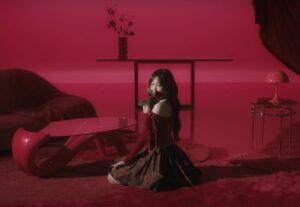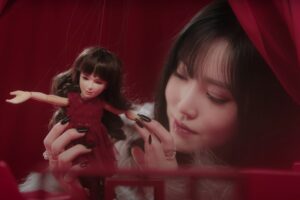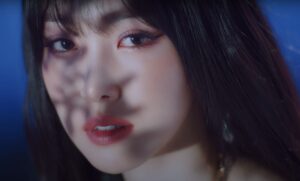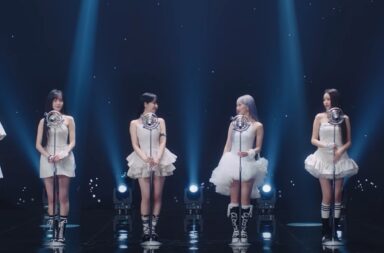
The abrupt disbandment of GFriend in 2021, while the girl group was at the height of their fame, remains one of the great modern mysteries of K-pop. While no sensible explanation for GFriend’s conclusion has yet come to light, 2022 is bringing the welcome return of many GFriend members to music. Three former members (Eunha, SinB, and Umji) will re-debut as Viviz in February, and after signing with Kang Daniel’s Konnect Entertainment, former main vocalist Yuju has made a solo debut with “Play”.
As the vocal pillar of GFriend, Yuju was famous for the sky-high belts that punctuated most of the group’s biggest hits. But besides her vocal prowess, Yuju is a strong dancer and charismatic performer. Her stage presence particularly stood out during the final part of GFriend’s career, when the group turned from schoolgirl concepts to more mature songs like “Apple” and “Mago”. In short, Yuju has all the elements to make a successful soloist, and in retrospect it’s strange that she never had an official solo release (besides OSTs and a digital single) while part of GFriend. But now Yuju has the chance to establish her own solo identity, and that’s exactly what she does in the visually sumptuous and vocally dexterous “Play”.
“Play” is the latest release to follow the red-hot K-pop trend of drawing on traditional influences. The song opens with an evocative plucked string motif that repeats with some variation throughout “Play”, forming the melodic backbone of the track. Traditional inspiration can also be seen in some of the MVs visuals, especially a striking blue set in which Yuju and her backup dancers wear hanbok-inspired outfits.
Speaking of visuals, “Play” is a minimalist, yet luxurious, feast for the eyes. The MV is painted in jewel tones, namely crimson and sapphire. Alternating between only two sets, a red stage-curtain bordered setting and the aforementioned blue set with traditional touches, “Play” nevertheless feels positively opulent. Clever tweaks within each set, such as swapping out different props and outfits, make the MV feel bigger than it actually is. The sweeping camerawork, which lingers seductively over draped fabric and an eye full of tears, amplifies the sense of unexpected grandeur.

“Play” also uses light and shadows to great effect, adding some disorienting drama to the whole MV. At times, Yuju and her dancers are turned into nothing but silhouettes as they perform the song’s elegant choreography. This choreography is unusually simple in the current era of mortality-defying K-pop dancing, but this is a sign of wise restraint rather than lackluster effort. Some songs are not well-served by twisty, high-octane choreography, and “Play” is one of them. The graceful arcs of the dance are a perfect match for the song’s leisurely allure. Additionally, because the dance is not so demanding, this leaves Yuju free to focus her energy on singing and stage presence. Her debut music show stage makes a strong case that this tradeoff is paying off, as she delivers a charismatic and very stable live vocal performance.
As is fitting of a solo debut for a renowned vocalist, “Play” gives Yuju lots to work with in that department. What really makes the song shine though is its choice not to rely on high pitch for its vocal impact. In fact, Yuju spends most of the track in a noticeably low register that emphasizes her voice’s natural vibrato. Then, in the last bridge and final chorus flourishes, she effortlessly stretches her voice up into stunning falsetto runs. As with its choreography, “Play” opts for restrained composure in its vocal approach. The result is a track that truly highlights Yuju’s vocal mastery and showcases her true range.

However, one area that “Play” doesn’t triumph in is storyline. The song is a typical scorned lover track, with Yuju lamenting the disappearance of a once dreamlike love. There are hints of a potentially intriguing narrative throughout the MV, especially in scenes where Yuju plays with a doll replica of herself in a dollhouse. The eery nature of this tableau fits nicely with the mood of seductive foreboding which pervades “Play”, not to mention how it wraps perfectly into the title of the track. But these sequences go nowhere, the MV instead relying almost entirely on dance scenes and glamorous shots of Yuju to fill its runtime. That being said, lyrically the stereotypical story of “Play” is elevated by the poetic bent of how everything is described:
Sewing up the time that’s been cut into pieces
No matter how many times I look back
We’re just like fireworks that sparkle and quickly put out
I’m becoming pieces of ash

Storyline isn’t the only place “Play” doesn’t quite fulfill its potential. As charming and well-executed as its musical elements are, the song lacks a proper crescendo. Though this style makes sense in concert with the track’s unhurried vibe, it’s a disadvantage in terms of memorability. Because it is so leisurely throughout, “Play” risks becoming forgettable or monotonous. On the flip side though, the song’s unpunctuated nature makes it somewhat hypnotic, which is not exactly the worst thing.
In spite of its flaws, “Play” succeeds completely in its major mission: establishing a clear and compelling solo identity for Yuju. Thanks to the introduction that “Play” provides, soloist Yuju comes off as someone with sophisticated charisma, vocal prowess, and promising songwriting skills (Yuju has lyric credits on all five tracks in her debut mini album and composing credits on four out of five tracks, including “Play”). Taken only on its own merits, “Play” is a good release. Judged as the launch of Yuju’s solo career, “Play” is downright fantastic.
(YouTube[1][2][3]. Lyrics via Kgasa. Images via Konnect Entertainment.)


